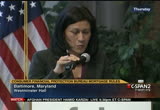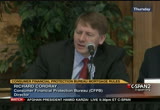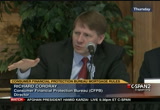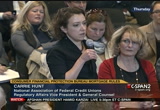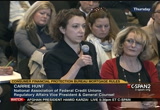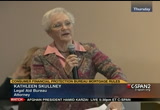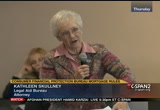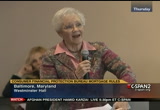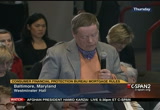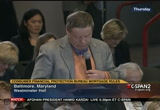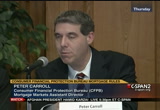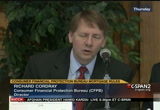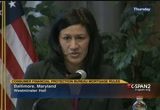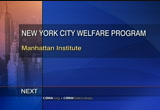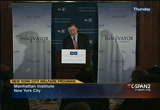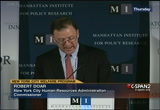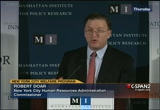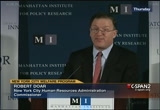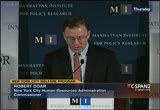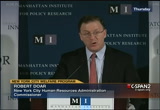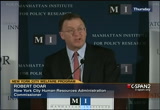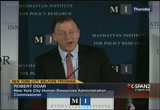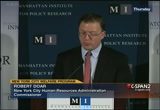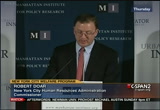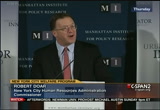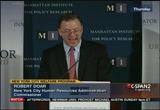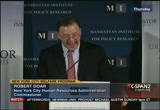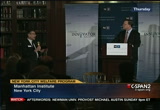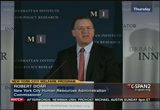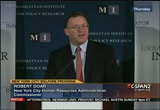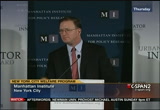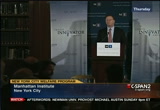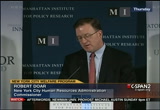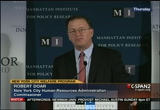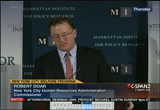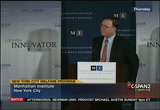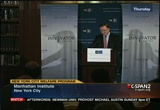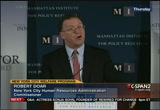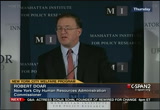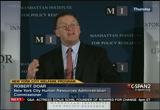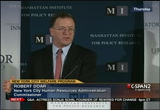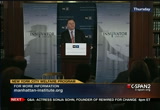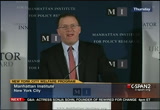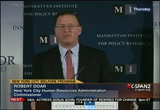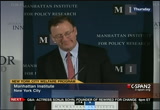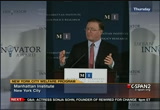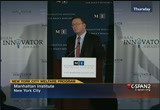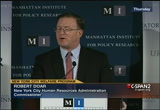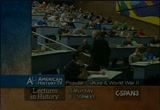tv U.S. Senate CSPAN January 11, 2013 5:00pm-6:00pm EST
5:00 pm
5:01 pm
[inaudible] so today's rule should both increase confidence in the mortgage market so lenders feel more ability to lend in consumer can feel more ability to look for loans and go to the closing table without being set up to fail. and both of those respects having a stronger market that has better concealer protections, as mike said on the panel, is good for lenders and borrowers and should be good for the market. in terms of how the market will
5:02 pm
involve over time, we're just going to have to see. we don't control all those details. we cannot mandate that a lender lend to any particular consumer. we can just set up the right framework so we can rule out the reckless abuses like before the crisis. we think that having done so we are going open space for the credit union lenders we talked about. some of the programs we're talking about the non-profit groups and others and the main lending community to be more confident about their ability to lend to homeowners and the market will support that and they won't have to compete against some. bottom of the barrel, abusive, misleading types of loans they were competing against. we're going have to see how the market evolves from here. >> thank you. >> brian cue kusack?
5:03 pm
terri hunt? good afternoon, my name is i'm the vice president of the national association of federal credit unions. i have hope we have credit union members here today? excellent. as you know, credit unions are charged with providing credit to this country. it's something that congress has specifically told us we need to do. i think that is a shared goal that we have with the cfpb. i want to thangt cfpb staff you have done. specifically at nacu. , my job is to make sure that
5:04 pm
our credit union members have rules they can live with, they can work with, that really help them do their job in lending to consumers, and i have work with your staff, we have expressed no concerns, we have tried to really express why we need a rulemaking that is effective. i hope that as we move forward, we really can take a hard look at the regime that's been created, and if it looks like that credit unions can't lend that rules aren't too restrictive, that really consumers who qualify who have the ability to repay loans aren't getting them we take a second look at what this country is doing. i would certainly hope that the cfpb would partner with us in making sure it doesn't happen. we appreciate that you ask for
5:05 pm
comments on credit unions and small banks to make sure that we can lend and hopefully we will continue to do what we do best which is what credit unions want to do. thank you. >> kathleen. >> thank you for taking my comments. those of you who know me know that i usually don't need a microphone, but very glad to cfpb here in the baltimore community. i am a practicing attorney in maryland, i have represented homeowners in foreclosure defense and mortgage-related claims far dozen years. and have recently retired from the legal aid. i was also privileged to be part of the governor's task force that resulted in significant homeowner protections in the
5:06 pm
statutory foreclosure process. i was privileged to sit on the committee that revised the court rules. i'd like to comment on my concerns over the safe harbor, and specifically join the reverend in her concerns. we are told here today that the safe harbor is necessary as an incentive to sort of kick start or break open, if you will, the credit access that is so bottled up. we also heard that this is a result of -- that the whole melt was a result of a assumptions and so on. it was really the result of fraud and mind boggling manipulation of the global financial markets. it really was. we all know what this. what borrows had did had very
5:07 pm
little to do with where we ended up. we are glad to see we are finally getting regulation related to this. back when the earth was cooling i was a security broker back when 60 mlt shares was a big day and securization made sense. what i would like to express is my concern in the concern and of my colleagues who practice in this area that if there's a safe harbor such as being detailed detailed detailed in this rule that it be subject to simple rebuttal. the rebuttable presumption limited to the sub prime borrow ers makes no sense. and all borrowers are entitled affordable mortgages, and that of a mortgage being affordable should be subject simply to a broad rebuttable presumption not a nearly absolute presumption. , by the way, maryland has an
5:08 pm
affordability statute, and consumers and borrowers didn't have to relinquish their right to the unfettered access for the courts to get that affordability requirement. so we would like to see that broaden the rebuttal presumption broaden to all borrowers. >> thank you for your comments, kathleen. john sullivan. >> good afternoon, thank you very the opportunity. i'm john sullivan from the buyer's edge and former president of the national association of exclusive buyers agents. my question to in your prepared remarking you refer to the true essence of responsible lending. i apply lawed -- applaud you for your efforts on instituting the
5:09 pm
regulation. you refer to reckless lending practice the housing foreclosure crisis. the vast majority of those cases, it was a real estate agent who knew or should have known that the home buyer didn't have the ability to meet his or her financial commitment. the real estate agent or broker like the lender's loan officer got a commission and hasn't been seen since. unfortunately the dodd-frank bill that created your bureau contains language that prohibits any action against real estate agents or brokers. my question to you is is there anybody in your bureau who has the -- to ask congress to eliminate the provisions to the dodd-frank bill and require the real estate community to make consumer aware of the agency choices when selecting the agent
5:10 pm
to guide through the maze of home buying. at the present time there are fifty state regulations none alike. some calling the same type of agency a different name. we need some regular legislation at the national level on agency disclosure to make sthiewrt consumer is protected when they're buying their -- or making the biggest purchase of their life. >> thank you, mr. sullivan. allison wang. >> hi, my name is allison wang and i'm an interested consumer. i would like to know the unemployment market is the uncreasing percentage of the population who mimics the self-employed hourly workers or independent contractors or freelancers. what protection does the rule offer to ensure full access to the credit market in light of
5:11 pm
the -- [inaudible] ability to repay. for those workers not fitting the traditional model tenured employee or salaried employeed? >> pete, do you want to take that? >> so the new ability to repay rule does include provisions for creditors to verify and consider income verifying income documentation is a critical part of the rule. making sure verified information is used any debt to income ratio. self-employed borrowers are a big segment in the market. and the rules we're putting forth provide guidance for how they should be considered. they should not be locked out of the market as a result of the rule. they are factored in to the guidance we provide with the ability to repay standard and as well as with the qualified mortgage standard. >> thank you, mrs. wang.
5:12 pm
vicky -- [inaudible] i had a question. >> i was not in washington whenned to frank was fiercely lobbied. i know, it was. there were a number of. exemptions renner to the law. to the extent entities are providing financial product or services to consumers. the the exceptions are complex. i'm sure downtown road there will be further consideration in congress how it's playing out. i want to point out one important feature that is new that the consumer bower row is no place to oversee not only financial institutions that are charter banks and thrifts and savings and loans as true before dodd-frank. but also nonbank mortgage lenders and others who participate in the market, it's important. you can't have a satisfactory or regulatory scheme. what you find is i they note
5:13 pm
order the. panel. karen going down the street getting irresponsible loans from people not subject to any standard and get -- cutting to the market. that rule is now in place and it cores the entire team for the most part of the mortgage lending market is a notable step forward. >> thank you for the comment. our last of the audience is vicky. >> thank you all for joining us today in baltimore. the cfpb field hearing the ability to repay the qualified mortgage rule. what we hear from you all, the wide array of interest represented here is very important. we listen very carefully, so we thank you for taking time from your day to talk to us. [applause]
5:14 pm
[inaudible conversations] [inaudible] [inaudible conversations] afghan president hammed karzai visiting the u.s. this week. met today with president obama at the white house. in a few minutes president karzai speaks at george town university. you can see live on our companion networking c-span. coming up later today c-span2 q & a with sonia on the non-profit group that works with high-risk youth through mentoring, after
5:15 pm
school programs and community involvement. that's at 6:00 p.m. eerp. at 7:00 matthew, director and producer of the movie that looks at problems in american health care and cost effective solutions. called roosevelt's heavily forested -- [inaudible] he unlike mrs. roosevelt, he knew when to be still in the presence of the president, when to back off and tell a joke. after he won the election, wendell was in his office. they remained friends. and he said to the president, why do you keep that man so
5:16 pm
close to you? that man being hopkins. he did not like hopkins. and roosevelt said, you know, you may be in the office someday and you'll understand, but he asks for nothing except to serve me. >> trusted adviser, friend, and confident to fdr. he lived in the white house for three and a half years. david on the hopkins touch. sunday at 10:00 p.m. eastern on booktv on c-span2. the manhattan institute earlier this week hosted a discussion on new york city's welfare program and efforts to transition welfare recipient to work. they awarded the 2012 urban innovator award to the city's human resources administration commissioner. [applause]
5:17 pm
thank you, peter. i want to especially thank you for your joke because you have provided the humor for our speech today. i esspecially like your reference to my position as a relatively on secure publish official. [laughter] you're correct about that. and thank you all to the manhattan institute not only for the honor but also for you have zone for our city. the list of important thinkers and writers of the institute who is positively influenced public policy in new york is long. so long that i hesitate to mention any except perhaps heather mcdonald, edge john mccain has -- i have known them a long time and greatly benefited from your insight and contribution. i also want to say how grateful i am to may your look berg.
5:18 pm
i have aver doubted he supported work-based welfare policy and he wanted me to stand strong and defensive policies that reduce our welfare by more than 700,000 recipient. increased work rate for single mother and reduce poverty. i want to credit and thank deputy mayor linda gibbs for maintaining these accomplishments while at the same time pushing me and everyone in the government to do more to raid the economic perspective of low-income nighers. finally, i need to let you know i represent a large 14,000-person city agency. one of the remarkable and under appreciated aspect of welcome reform in new york city is the extent to which our employees have endorsed and acted on the personal responsibility emphasis and work focus of welfare reform. it's a little known fact that
5:19 pm
the best way and quickest way to find an ardent reformers on the front line of our cities welfare agency. we couldn't have accomplished all that we have without our work force accepting and working on the challenge. i hope you don't mind if i begin with a little bit how i got welfare reform business in the first place. i was very lucky to be asked to join the administration in fall of 1995. i had previously worked on a congressional campaign for the washington monthly and ran for state assembly for myself. at every state id a vot candidated for policy that reformed welfare and ask for personal responsibility from the recipient and emphasize work and family as a path out of poverty. not government assistance, or welfare right or entitle element. my first exposure to do anything about the concern came when the governor asked me to be the director of the state child support enforcement program. to tell you the truth, when i
5:20 pm
was asked by friends how i got the job, i used to reply, well, it turns out that when republicans are in charge, the line for jobs and social services is very short. [laughter] created by a federal schiewj during the board administration, the nation's program was supposed to something about absent fathers and children on welfare. it was supposed to make deadbeat dad pays for the care of the children. the care the state was providing. lotloty goal. at least in new york child support enforcement was a back water. the bastard child of social services one person told me. the possibility to prevailing theme of the cuomo administration. it's method of using law enforcement technique to track down absent fathers were embarrassment to the judicial social workers. they were only in the business
5:21 pm
at all because it was a federal requirement that came with a generous federal funding. needless to say, in the first year of the administration, it was great place to work. there is nothing like being dwifn a job -- given given a job where the only path was up. i was lucky and fortunate to have the total support of the governor. as i have said child support enforce was a great responsibility issue which the governor cared about a lot. and even better perhaps it was a great womens issue. the parent was almost always the mother while the political push for childhood collections rarely came from the traditional poverty groups they were happy with the government taking over the care of children. there was a real grassroots lower middle class group of women who were not receiving welfare but would have been frustrated and abused by the traditional court processes for divorce and support. these women were demanding that
5:22 pm
we do a better job for them as well as -- [inaudible] but my purpose today is not to talk about child support enforcement. i promise i'm going get to welfare reform in a minute. all i will say further we shamelessly stole from other state innovation. we promoted personal responsibility, message of the program and collections rose dramatically to more than $1.5 billion statewide in 2006. so i was again lucky to be working in social services when even before the passage of the federal welfare reform act. the mayor brought special -- here in new york city. the governor and mayor may have had their disagreement. but as the person responsible for communicating the state's positions to city officials, i never saw it. in fact, to us in the state oversight agency, the message from the governor's us office
5:23 pm
was always clear. make sure you help the mayor reform welfare. there are five key elements to welfare reform. they were essential in the early years and remained seller. let's take them one at the time. work first over education training. offering adult welfare recipients education and training may sound nice, but study after study has shown that it doesn't work. the key has been to require 100 percent engagement in work or work-life activity. in force consequences for families. in order to receive the government's cash assistance, welfare applicants or recipients have got show up and show us they're actively engaged in work or getting there and we will honor they are doing this. strong antifraud measures. welfare programs cannot be naive about the capacity of citizens
5:24 pm
to try to get it over on the system. we are not afraid to check asset and income, residency, and identity to be be sure the taxpayer funded benefits are going those who legitimate qualify. and performance-based contracts. we pay our not for profit private sector vendors. they were one of the fist social agency to use 100% performance-based contract to provide performance. and we continue do so today. now there is another element of our success that i want to give additional attention to this afternoon. we strongly endorsed work support to shore up wages for low-income families. let me repeat. a key to the success of welfare reform in new york city were the significant investment in income or work support for working families. these are thes a penalties of -- aspect of health that the nyu professor is talking about what he refers to welfare reform as
5:25 pm
the combination of hassling and help. what are these supports for working families? one is child support enforcement. that program collected $300 million for new york city families many on formerly on welfare. in 2012 we collected more than $739,000. another is public health insurance or medicaid. i have great concerns about the way the state manages the medicaid program. how health care people are monitored. the mayor the problem in medicaid is not that we enroll too many people. they expanded health insurance, public health insurance, mayor provided health insurance something of a personal crusade, and the mayor made it clear it's better to have people insured than not and the effort to make it reach as many new yorkers as possible is more than 95% of new
5:26 pm
york city's children have either public or private health insurance. hour uninsured rate for children is less than 5%. virtually universal coverage. the best it's ever been and better than any other large city in the united states. therred income tax credit is another important thing. we have the most generous in the country because here in new york city we add a state credit and city credit to the mix. this tax credit is a classic transfer program it provides far more than the amount needed to refund payroll tax and the expenses. but probably most important the earned income tax credit helped keep low killed is workers working and off cash welfare. there are food stamps. here the level of support has been uneven. one of the differences between the bloomberg administration about predecessor is the my your so long as we can expect the work and there are adequate fraud preventions and finger
5:27 pm
images believe they are another important element of our efforts to increase the economic strength of low-income working families. push by federal and state policies which we are required to -- and by our own desire to make the application process simpler for our recipient and workers. it's grown dramatically from 779 re,000 recipient in 2000. to what we have now is not an entitlement based welfare system but a work-based welfare system. if you're able bodied and you can work, you must at the condition of receive assistance. it you do we will make your earnings from work go farther. if there is an aspects of our work support system that makes the uncomfortable it is the diminished goal of self-sufficiency. in the early years of welfare reform messages were important. we emphasize personal
5:28 pm
responsibility, self-sufficiency, and time-limited assistance. we spoke against government dependency. the focus on the effort of the individual not the government. but in our drive to provide work support, worry we have lost the message we need to back. we found welfare reform that messages matters and we need clear messaging from our leading why the government should provide support, the responsibility for one's economic success and prosperity lies with the individual and the family. president obama's second inauguration creases coming up soon it will be a good time for him to remind the country that our government is dependent on the people not the other way around. we also need more clarity and discussion from all leaders about the importance of family. despite the wide spread -- children do better two parent married households. despite we know about the instability in financial hardship caused by single
5:29 pm
farpting, trying to raise parents on their own, and despite statistics about worse educational greater criminal justice involvement and greater welfare usage among single parents. despite this our leader, our university, our media, religious institution and the leader where the group with the problem is most severe the african-american hispanic community refuse to take this issue on aggressively or deal with it in any meaningful way. this problem is particularly glaring in the reporting of most our media, which to sometimes celt, devotes great effort to chronicling remarkable details the difficulty of the poor but can't seem to ask the subject of the story a simple question, where is the father? and then there is the president. there could be no better voice on the important issue of family and the role and the role fathers play in the lives of children than the president of
5:30 pm
the united states. with the first lady he sets the absolutely correct example but he says so little. and he almost never turns hyper critical eye on this issue. he's good at describing america's shortcomings and failures. not this one. the most eloquent expression of the role of a married father came from the first lady during her democratic national convention speech. she described her disabled father rising every morning to head off to work. how she and her brother fulfilled her father's dream for going to college which her father rodely helped to pay. for my dad, that's what it meant to be a man. it won't happen. it surely won't happen. it would be nice if president obama used the second inauguration address to reframe
5:31 pm
kennedy's call not for what your country to do for you but remind meshes that strong individuals and families are still the essential prerequisite to a successful america. now i began this afternoon by thanking various leader and government agents for their help in changing welfare as we knew. before i end, i need to say that the biggest key to success of all was the recipient themselves. we in government in press releases and promotional material like to say we place people in jobs or got jobs for this number of people. but anyone who actually does that work knows that the person who gets the job is the person who gets the job. and that act thousands and thousands of times every year by former or perspective or current welfare recipient of getting a job and earning a wage is what made welfare reform a success
5:32 pm
and proved that poor new yorkers and poor single mothers can and would choose responsibility and greater independence if only they were asked. thank you very much. [applause] [applause] >> thank you so much commissioner doar. if i might start the questions. i'm struck by your comments about the decline and emphasis on self-sufficiency and how complicated it is, because you want to support work but at the same time there's a potential down fall to it. it i was wondering if you feel that that implied the like lie hood of an increased kind of pa termism -- [inaudible] hoovers what i'm talking about.
5:33 pm
one of the most interesting things you try to do was to limit the use of food stamps for sugar drinks and the washington actually wouldn't let you do that. >> they said no. >> right. i know, that mayor bloomberg definitely wants do you do that. >> yes. >> but i want to ask you, do you think that is the future that is if we're going supporting the people through the earned income tax credit and the things we mentioned, is inevitable we're going to be seeking influence their behavior and a is that a good thing? >> well, i think the analogy to the food stamp issue we pursued with the obama administration where we asked him to test the experimental project where we limited the use of the food stamp benefits for products that were clearly unhealthy and contributed to the obesity problem and higher health problems was more about health care and more about a health problem than about a sort of
5:34 pm
concerted an premeditated desire to influence people's behavior. the mayor is very devoted to and very committed to policies that improve the health outcome for families and people in the city of new york. it was something he absolutely believed in, and fought hard for. unfortunately the president and secretary of agricultural said no. it wasn't something they wanted to test or go through with the experiment with. i don't know that the bloomberg administration that that carries forward to many other places or ways. we want to encourage work. we think work is a key part of a individual's life and livelihood of the city. and it ought to be a prerequisite. it's called the supplement tal nutrition assistance program. and the use of the food stamp benefit to purchase products clearly unhealthy seemed like
5:35 pm
why don't we try limiting that and sending a message to recipient they should buy products that are more appropriate for their health. so i don't know that carries forward. i do think that it is a lot of messaging. i think the sans of the -- with regard to the message about self-sufficiency and independency, you know, it's a different political world we're in. we have democratic governor and democratic president, and they are more interested in government-sponsored solutions and less interested in talking about independence and self-sufficiency. i think that's part of the problem, but so -- there's my answer. >> let me open it up to questions from floor. >> [inaudible] >> yep. >> larry mead from nyu. >> yeah. [inaudible] >> yeah.
5:36 pm
robert, i want to pick up on comment about mate your's problem with the family problem. i think since we made progress in raising workload some of the people in welfare, it is said that shift priority toward addressing priority and family break and non-- [inaudible] i agree with you that it's a very sensitive issue that people find hard time addressing. from your comments, i had a sense that maybe you think that the best way we can promote it is just to stop accepting -- [inaudible] we have to say it's improper. it's not a good idea. we have to go back to a policy where we -- [inaudible] we know from various opinions surveys that the public is uneasy about that. they don't want to sigmatize single mothers and they don't want to a decline of a family. is it rhetoric, is it public
5:37 pm
campaign? what are you suggest and i lean that way myself. is there a practical thing you can do at the policy level that will promote the family? >> someone in the practical world of policy and public agency work, i've struggled with this immensely. it is very hard tow pull a -- to pull a string or objective to promote a marriage greater than single parenthood which is what we need. what we sort of default to, obviously, is public relations campaigns, promotion, and sending the message. that's all we have left. what was trying to say today we're not trying to talk about that enough. and there is just this great discomfort, but so i don't -- i think it was clear that's the only answer i have on that issue. we know lots of sickle parents do very well and able to raise children. we certainly don't want to -- i
5:38 pm
think it would be going too far to deny assistance or turn our backs on them, but clearly it is a part of the significant part of the problem. >> yes? [inaudible] >> they're all coming from the head table. [laughter] >> as somebody who admires your work, robert, knowing how challenging it is, having had that job before. here is my question. i think you're the first commissioner that served three conservative mayor terms, it's very difficult to serve one term without getting fired. >> wait a minute. i'm not worked for mayor bloomberg for 11 years. i want to make it clear about that. -- [inaudible] [laughter] all right. >> three bloomberg terves which you -- terms which you served in the majority. what is your key to success? [laughter] >> well, what i used to say -- i
5:39 pm
worked for the governor right to the last day. it was december 2006, and i remember when we left the office, i had my 9-year-old or 8-year-old son and insisted on leaving the notes on the chair. they were i picked them up and the first one said boo elliot. [laughter] i said i'm like i don't know if that's the right message. [laughter] but the -- i'm sorry, governor, so i am -- i wanted to -- i was not -- i -- then what happened is mayor bloomberg picked me up on whatevers. -- waivers. the current commissioner was going to leave and he saw i worked with the city so aggressive and so much. i had. supportive. he offered me the job. the key to staying successful or appearing successful in city government is to, first of all,
5:40 pm
focus on your employees. focus on the people that are in your team. be a good internal leader first, because i talked about the importance of hr employees in the speech. but good public managers have to keep their teams together and on board. when you watch commissioners that fail, in any administration, you'll often -- if you pull the string you'll find some came from the own internal management problems not necessarily what they said publicly. secondly, i always felt that in the city of new york. i remember i bro wrote it once in an application of a job. the key to being good is not worrying about what "the new york times" said, ever. and that mayor liked that. and i'm comfortable with that. and so that's worked. then the other has to do with the on secure issue. i don't -- i'm not a big
5:41 pm
self-promoter. i just dot job and focus on the outcome and numbers. sometimes that has been successful and we have gotten numbers we want to work on. we have been honest and talked about it. we returned every city councilmen's phone call within a couple of days. we testify before them. we take the battering and we keep at it. i think it's, you know, there's a year to go, and bloomberg administration we are fond of saying there's 352 days left or 356 days left. maybe people are cowbilitying and third -- counting and third terms are tough. my view at this point, let's see it through to the end. >> [inaudible] meyers. >> thank you. >> michael meyers, [inaudible] i wonder, commissioner, if you would comment with respect to the changed progress of welfare reform policy. [inaudible]
5:42 pm
did not come -- [inaudible] now in your current policy is encouraging -- [inaudible] with respect to the change in social values. [inaudible] now family is redefined. >> right. >> you can't have a situation where you are -- [inaudible] and defining parents of parenting and family with respect to father being a head of a household. the second thing i want to talk about is the work requirement and the context of massive unemployment and movement for the wages. >> sure. i'll do both. i'm glad you raised the about the issue of the father in the house. the other way we sort of pry -- try to tackle the single parent family issue we concede a little bit on marriage and say, let's work with the dad with
5:43 pm
employment programs, with programs that make the child work enforcement program a little more giving and understanding. we bring them to the system and promote it and fund parenting programs. the idea we can get better outcome for children not married families versus nonmarried families. but married families versus with nonmarried families with active and financially contributing parents married or not. and then there's those where the father is not involvedded at all. that's our hope. we know we will be continuing to cultural issues. what we trying to do and the mar your is started nyc dads' knishtive. we have a coordinator working on the issue. we are kind of taking the comprise solution. we can't gate married and can't established married household. let's get both parents involved. that's what we're trying.
5:44 pm
there's a lot of people including myself who have hope for that. larry mead talked about this as well. but the results aren't in yet. we don't know yet whether that's working. we do know if a parent is paying -- supporting them financially they are more likely to be active. we know that household that has a child support collections do better because both parents contributing. we're going at that. with regard to the unemployment issue, we have greatly benefited in new york city because even during the recession this enormous array of opportunities for unskilled or low skilled new yorkers has remained in place. we have a vibrant tourist industry, we have vibrant retail industry. we have opportunities, and it's never been very hard even during the recession for us to find people jobs in new york city. i don't know whether that's true around the country. that has been key. and i have to say that when it
5:45 pm
comes to the waijts, you know, we're -- wages i guess the governor proposed to go to $8.75. not very many people leave welfare for our we place jobs for $8.75. new york city wages are generally higher than that. while i'm as a sort of economic theorist, minimum wage legislation makes me nervous. i don't think the practical effect would be as severe. maybe for teens, i think a farmworkers or workers upstate where wagers are lower is a problem. in the city of new york, i'm comfortable that we can adjust around it. the problem, the issue the one worried about work support has to ask themselves are our work supports in some way not just good for the employees but also good for the employer? are we allowing employers to be able to have workers they might not ordinarily have that add value to the business, and allow them to compete in a
5:46 pm
international market or against other ways people can use their money, and make their business more vibrant or competitive to businesses where wages are lower? and i think there's some truth that. i believe that. so i've always thought that particularly public health insurance, now what obamacare is going do is another question. i'm not sure what's going happen then. the mandate and requirement and employers begin to realize they face penalties if they don't have workers or too many workers working for too many hours and not providing health insurance. that's a wild card. one other thing i want to mention, and it wasn't asked, i want to mention one thing, when people worry about the costs of the new work supports, you really need to divide them between health care-related cost, health insurance related cons and the rest. in new york city we'll spent about $35 billion on medicaid.
5:47 pm
food stamps is three, cash welfare less than one. the child care credit are hundreds of millions. so i do worry that those who are concerned about over abundance of work supports may lose focus on the real problem in our government spending, which is health care, retirees, entitlement benefits, and things think we'll solve the deficit problem if we turn those work supports back. it won't work. you wouldn't get the money. i don't think you'll be doing the right thing. so it's very important to remember that we have -- while i work for government and i sponsor and support spending in government for people who are poor, i'm also conscious of the fact that we made commitment in our country that are beyond what we can afford. but those commitments are not
5:48 pm
related except for the case of medicaid to these programs. they're not related to the earned income tax credit or even food stamp benefits. [applause] >> yeah? john. >> that table again. [laughter] >> here is a man who knows how to wait for the mic. >> yes. >> when you say you testified or your people testified before the city council what do they complain about? [laughter] >> you see, a good laugh. -- [inaudible] different in new york city than it is in other parts of the country, i'm sure. it's different than albany. it's not that much different. there's a strong perception among folks that i testify with, we should not ask anything. we should not require anything. we shouldn't require a
5:49 pm
documentation, we shouldn't expect anybody to do anything. we should just provide struggling people with a minimum level of support and then be done with it. and that didn't work. it doesn't work and the mayor doesn't support that. so often that's what the push is. why didn't you give that benefit to these people as fast as possible? why are you asking them to be finger imaged to make sure we check their identity and don't abuse our system by having people take advantage of it. it's always about being increasing the transfer of money from government to the population they represent. that's always what it's about. >> yes. [inaudible] changing cables here. >> all right. mike the goodman the new york post. commissioner, i would like you to go back about the -- [inaudible] as i recall statistics there are
5:50 pm
roughly 50,000 children born each year in new york city out of wedlock. so in mayor bloomberg's roughly ten years half a million kids born out of wedlock. it we were to see it as a public health crisis whether it's obesity or crime or poor education outcomes, why couldn't it be attacked or approached in the same way as obesity or public service announcement about the value of marriage and the or ors of -- horror of out of wedlock birth certificate. and i ask you to be creative about this. if you could design a public service campaign to encourage marriage, you had the unlimited money of -- how would you do it? what would it say? >> we are talking about doing that, actually at hra and the thing that we think is the most -- it's tricky issue and lots of people westbound it's not the --
5:51 pm
it's not the same level of consensus with the public health campaign with the antiobesity or antismoking. what we think is a way of approaching it through the perspective of the outcome of the child. whenever i'm in the sort of frontlines of welfare policy and i meet with recipient or young people who talk about the issues, i always worry that they get the sense or they have the belief that somehow or another the government will resolve our overcome for them and they will be able to resolve or overcome the problem of the fact there isn't a second parent in the household for their child. it will work out or you'll take care of me or something will work out. and the statistics are so clear that we think the better way to do it is to try to turn the conversation not about mom and dad but about the potential
5:52 pm
outcome for children. and try to get young people and people who are considering having children before they are prepared to consider the likelihood that their child will do well in school or succeed economically. that's one way. now that's something that we're working with, we're talking about with, trying to think it through, that's the way we're working it through in the government. i have to say it's not resolved because we will have to talk to at love people -- a lot of people in test groups our our own sister agencies and see if we can resolve the discomfort, even that will cause for people that just don't like talking about this issue. >> there's only 360 dais to go. >> yeah. >> one last question. >> yeah. that guy. he had the whole time up the whole time. >> go ahead. >> ed thompson.
5:53 pm
[inaudible] the discussion so far pertains to out of wedlock -- and single parent families. it all begins before that is having children out of wedlock in the first place. so -- that goes back to basically i would say to high school. wouldn't the program, in high school teaching responsibility or parental guidance however you want to label it. you see where i'm going with this. >> yeah. we do that. >> it might not be . >> it is done. the department of health and we i remember when i worked at the state, we produced a curriculum for the responsibilities of young high school boys they need to be aware what the child's work force program is about. and their responsibility for their children should they have them would go for twenty one years. we have spread that curriculum
5:54 pm
about. the schools talk about this, then there's of course contraceptive. and so we do that too. and to be fair, the teen birthrate is down dramatically from where it used to be. down in the city and around the country. it's gone down, and teen pregnancy rates are down. we are making progress on that the 50,000 number that michael mentioned is could be much higher. but i just think that we need to do even more. >> i'd like to followup briefly. if you're telling children that the give is we have the program for when you'll have babies or -- you see where i'm going. what about a program that says don't have babies, out of wedlock wait until you're married. . >> [inaudible] >> no. no. listen the self-sufficient message i mentioned we don't
5:55 pm
emphasis quite as much as we used to had an effect on decision making, and the welfare policy i've talked about. because people and studies have shown child work force programs reduce nonmarital birth and teen pregnancy. if you're sending a message that we're not going to make life easy and simple for you just because you have a child, that does have an effect, i think it has broadly in welfare policy around the country. that's why we have stuck with the work requirement and set up work requirement involving single moms very young children. we don't give in on that. even here in new york city. that, i think, has had an impact. there's no question about that. it's just we wish it was -- [inaudible] >> please join me in congratulating the 2012 winner,
5:56 pm
commissioner doar. [applause] [applause] [inaudible conversations] ways to reduce gun violence. today he met with representative of the video game industry and plans to present recommendation to the president next tuesday. "the washington post proports it's likely to include more funding for police officers in schools as well as background checks for firearm purchases an a ban on high capacity ammunition clips. the presidential inauguration is ten days away on monday january 21st, the gavel to gavel
5:57 pm
coverage from the inauguration ceremony begins at 11350 a.m. they swear in joe biden. at noon eastern chief justice john roberts swears in president obama for a second term. later in the day the inauguration luncheon at the u.s. capitol and the inauguration parade along pennsylvania avenue. you're watching c-span2 with politics and public affairs weekdays featuring live coverage of the u.s. senate. on weeknights watch key public policy event. you can see past programs and get the schedule at the website. you can join in on the conversation on social immediate why sites. -- media sides. ♪ hollywood's most famous movie stars lead the film call tal to help the government sell war bonds.
5:58 pm
all part screen celebrity giving their time to lead the national war effort. >> the popular culture presented the war. how did -- how was it presented from the 1940s? how was it presented in comic books? the 1940s? how it was presenting in athletic events from the '340s and '40s. how it was supported in tin can alley. on american history tv popular culture and world war ii with purdue university professor randy roberts. lectures in history. saturday night at 8:00 and 10:00 eastern on c-span3. if you ask how they identify libertarian people who describe themselves as libertarian. depending which poll you look a you might get between 10 and 15
5:59 pm
percent. if you give people a batter i are of questions about different ideological things do you believe in x or y and you track those to different ideology depending at which you get up to 30% of americans that call themselves libertarian. if you ask the following question, are you economically conservative but socially liberal? you get over half of americans calling themselves saying that's what they are. now that said, just because people say them. it doesn't necessarily mean they really believe them. if so you ask americans do you want smaller government. they say yes. if you want government to spend less money they say yes. but ask them to cut a particular budget they don't want to cut anything. it's not clear if they believe in it. based on the best bet roughly as low as 10% and as high as 30%. if libertarian were a conscious and political, they could be a big movement.
110 Views
IN COLLECTIONS
CSPAN2 Television Archive
Television Archive  Television Archive News Search Service
Television Archive News Search Service 
Uploaded by TV Archive on

 Live Music Archive
Live Music Archive Librivox Free Audio
Librivox Free Audio Metropolitan Museum
Metropolitan Museum Cleveland Museum of Art
Cleveland Museum of Art Internet Arcade
Internet Arcade Console Living Room
Console Living Room Books to Borrow
Books to Borrow Open Library
Open Library TV News
TV News Understanding 9/11
Understanding 9/11